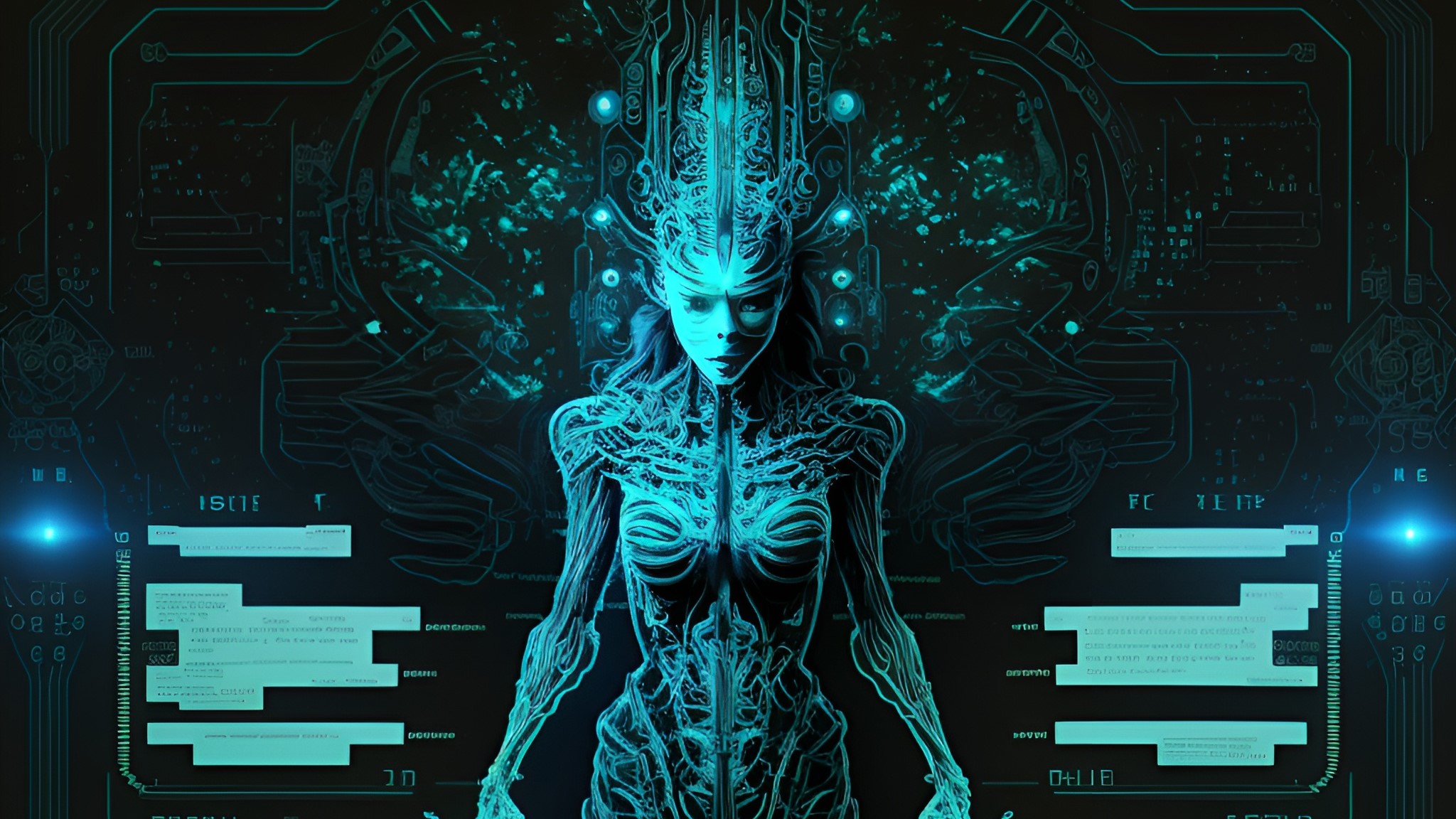System Shock publisher Prime Matter angers fans by having an AI imagine its own evil AI
Shodan have done that.

The best-laid plans of mice and men, per Robert Burns, can often go very wrong indeed, as the System Shock remake publisher Prime Matter has just learned. The company embarked on a little marketing stunt that probably seemed like a good idea at the time, which has been met with fierce pushback: It used the AI software Midjourney to create a picture of Shodan.
We'll get to the pushback but this isn't the worst idea in the world: As the post with the image says, it's "designed by an immortal machine for an immortal machine" and, y'know, you're not supposed to like Shodan or what she represents. You can even see why this felt like an appropriate experiment.
Look at you, hacker: a pathetic creature of meat and bone. Your body, weak, fragile.How can you challenge a perfect machine?Imagine, how would my immortal body look like? Designed by an immortal machine for an immortal machine.#SHODAN #SystemShock #midjourney #rogueAI pic.twitter.com/i4Gwi2bpdQApril 28, 2023
But us meaty fleshbags didn't like it one bit, and the reaction was overwhelmingly negative. Partly this seems to be coming from the fact that System Shock is a remake of a much-loved game from decades ago that was very much made by meatbags, and partly it's reflecting the wider social unease about just what exactly is going on with AI technology.
"That's not how you advertise a game crafted by people with passion for a franchise," reads one reply. "Pay an artist," reads another, "I don't want to see slop made from a plagiarism machine." There's generally a deep distaste for the technology and the current hype around it, as expressed in this memorable simile: "AI chuds and cringe go together like bread and butter."
The backlash was directed almost entirely at System Shock developer Nightdive Studios, the presumed author of the AI Shodan tweets, but Nightdive later clarified that it wasn't involved in any of it.
"The Twitter account is not controlled by Nightdive; the original and subsequent posts were made by Prime Matter," Nightdive director of business development Larry Kuperman told PC Gamer. "These statements do not reflect Nightdive's values nor are they accurate in terms of the development of System Shock. To be clear, no AI generated art was used in the development of System Shock."
A while after posting the image, Prime Matter addressed the reaction.
The biggest gaming news, reviews and hardware deals
Keep up to date with the most important stories and the best deals, as picked by the PC Gamer team.
"An AI using AI to imagine what AI would look like in a physical form; doesn’t get more meta than that…" reads the publisher's statement. "[Shodan] was one of the first examples of 'AI running amok' in video games (albeit a concept pioneered by HAL-9000 in 2001: A Space Odyssey movie) and the potential of AI being smarter than humans is a concern felt by many. And given events at Google today feels very timely."
This reference is to the departure of AI 'godfather' Geoffrey Hinton from Google, who left with some rather dire warnings about elements of the field that "are quite scary."
Prime Matter goes on to say that this was purely about "using AI to imagine what AI imagines itself to look like" rather than replacing any human creative endeavour. It ends: "We will use AI again to create other pieces (including artwork). We may well use AI in other areas too. But this will never be at the expense of using skilled people or their creative talents."
It doesn't feel especially outrageous to me that it used a widely available creative tool in this way, though perhaps there was some confusion over exactly what it was doing: there's no suggestion that the System Shock remake will feature AI-generated imagery. And Shodan is a touchstone moment for a lot of PC gamers, with the sequel in particular delivering one of the great gaming reveals, and people can get precious about the things they love. We'll know soon enough if developer Nightdive can deliver where it really matters: After a last-minute delay, System Shock is due later this month.
Correction: Our story originally attributed the AI-generated Shodan tweets to System Shock remake developer Nightdive Studios. The Twitter account is actually controlled by publisher Prime Matter.

Rich is a games journalist with 15 years' experience, beginning his career on Edge magazine before working for a wide range of outlets, including Ars Technica, Eurogamer, GamesRadar+, Gamespot, the Guardian, IGN, the New Statesman, Polygon, and Vice. He was the editor of Kotaku UK, the UK arm of Kotaku, for three years before joining PC Gamer. He is the author of a Brief History of Video Games, a full history of the medium, which the Midwest Book Review described as "[a] must-read for serious minded game historians and curious video game connoisseurs alike."

